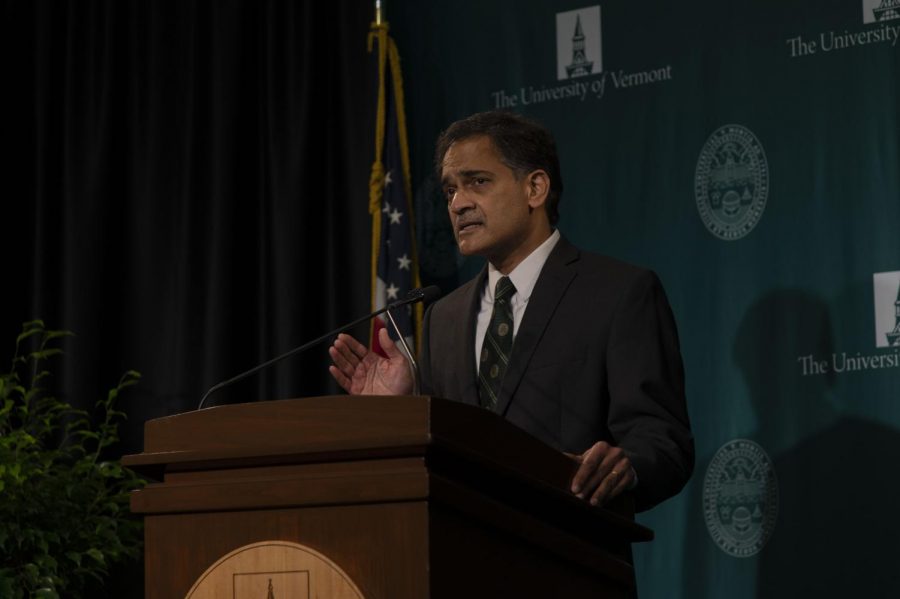UVM requests $10 million funding increase from House Committee
UVM President Suresh Garimella announced UVM will freeze tuition for the 2020-2021 school year at an Oct. 26 press conference, marking the third consecutive year of the school’s tuition freeze. The president also announced a room and board freeze and a new scholarship for underrepresented students to attend UVM.
UVM President Suresh Garimella requested a $10 million increase in the University’s base appropriation from the state’s House Committee on Education Feb. 10.
The current base State Appropriation budget amounts to just over $42.5 million, according to UVM’s 2022 Detailed Operating Budget report.
These funds support academic, administrative and department operations. UVM has not requested an increase in appropriation funding in 14 years.
If approved, the budget will rise to roughly $52.5 million, said Wendy Koenig, director of federal and state relations.
The House Committee on Education in the Vermont General Assembly, the legislative body of the state of Vermont, considers the educational needs of Vermonters pertaining to financial affairs, according to the Vermont General Assembly website.
“Such an increase in base funding would really allow us to continue our commitment to affordability and access,” Garimella said. “That’s been my central focus, it’s part of our strategic plan and it serves the land grant mission for our state.”
Garimella has sustained a tuition freeze every academic year since taking his position as UVM’s president, according to a Sept. 15 Cynic article. He announced plans to freeze tuition this past fall, marking the fourth consecutive year.
The University also plans to re-request the $30 million to improve the heating, ventilation and air conditioning systems to improve the air quality in buildings on campus to ensure the safest environment possible in the midst of the pandemic, Garimella said.
For FY 2022, the University has a total Operating Revenue Budget of $714 million, $376 million of which is general funding that allots to base appropriation funding, according to the University’s 2022 Detailed Operating Budget report.
The Operating Revenue Budget provides a summary of UVM’s overall budget and gives details of the University’s total operating budget including the General Fund and Income/Expense activities, according to the University website.
UVM requested the $10 million increase in appropriations after four years of frozen tuition. Room and board made matters challenging because it’s a big expense to the community as almost half of in-state students have their tuition covered in full, Garimella said.
Over the last five years, 44% of in-state students have had their tuition entirely covered by the University, according to a Jan. 23, 2020 Cynic article.
In July 2020, the University introduced a new Office of Engagement which the state legislature funded $2 million to start up, according to the University website.
The Office of Engagement consists of researchers, faculty and students that private, public and nonprofit entities can directly consult with if they are interested in approaching the University, according to the Office of Engagement homepage.
The University’s Office of Engagement supports the University’s land-grant mission, which enhances the economic and social well-being of the state, according to the University website.
“One of the most important areas that I personally believe is quite critical for the state is to double down on internships that are offered within the state,” Garimella said.
If graduates feel there is a future in Vermont career opportunities, they’re more likely to remain in the state, Garimella said.
Every year, the University adds over 1,000 graduates to Vermont’s workforce and UVM’s contribution of direct and indirect economic activity comes out to $1.33 billion, according to the University’s 2017 presentation to State Legislatures.
While the office operated well so far in engaging the state with professional education, the increase in funding would help with the affordability of the University, Garimella said.
“Being one of the most expensive public institutions in the country isn’t very hopeful in the longevity of our success and sustainability,” Garimella said. “So this shot in the arm from the state will be a good message, and we have committed to continuing to do our best for affordability.”










